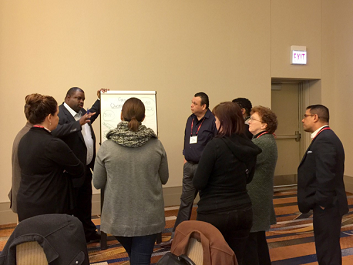One message heard frequently across the IT industry over the past few years has been the need for expansion. Not simply growth for the sake of increasing revenue and contracts, but an urgency to attract next level talent to support an increasingly complex set of business needs. Our industry must do a better job of widening the net, doing everything possible to attract and properly prepare the next generation workforce for success.
That mission is not, nor will it ever be, an easy one. Awareness and outreach programs require broad support and, despite all the IT job opportunities that currently exist, it will take a tremendous effort to overcome many of the misconceptions about IT careers. Not everyone is as enlightened as industry insiders.
Nonetheless, everyone should be encouraged to consider a career in IT and we, as a community, need to extend that reach to every potential audience. That takes more time and resources than any channel provider, vendor or distributor could do on its own; but collectively, we can make it happen.
That is what empowerment is all about. Extending our reach to give everyone the information and tools they need to be successful in our industry. As the saying goes, “all rising tide lifts all boats;” and the IT community is the perfect example of that mantra. Innovation requires continual new approaches and ideas. A diverse audience brings those conversations, and everyone can benefit from the resulting programs, processes and technologies — from tech firms who deliver them to the businesses and consumers who utilize these innovations.
The new CompTIA Advancing Diversity in Technology (ADIT) Community clearly demonstrates that ideal. While formally launched at the Annual Member Meeting in March, the leadership team has spent the past three years studying industry needs and working with a host of industry and outside professionals ensure the group has a viable long-term mission. Just like the other CompTIA Communities, ADIT members will further shape the mission and create initiatives and collaborative working groups to accomplish their short and long-term objectives.
Leading those efforts is a literal who’s who of the tech industry, including community chair Nathan Archer, Director of Business Development for A & H Technology Group and vice-chair Aaron Woods, Director of USCU ASP Relationship & Programs for the Xerox Corporation. Those two, along with executive council member Barry Williams, Executive Director of Indirect Channel Sales for Comcast Business, championed the ADIT vision and recruited a cross-section of industry professionals to ensure it hits its mark.
Fostering an Environment of Inclusion and Empowerment
The challenges they face may be quite similar to that of the CompTIA Advancing Women in Technology Community founders. Over the past few years, that group has worked tirelessly to create a litany of programs to engage women of all ages in IT career discussions. That population has also been underserved in the industry, but the work they do is all-inclusive and their outreach programs benefit everyone. While they develop resources to reach and empower certain segments of the population, they promote the wide-ranging job opportunities in high-tech to all.
 The first step is acknowledging that the industry has struggled with diversity. “The African-American and Hispanic/Latino communities continue to be underrepresented in IT corporations in America,” emphasizes Woods. “In fact, a recent article on the topic illustrated that, on average, Blacks hold only 5% of the jobs at large tech companies, with Hispanics/Latinos filling a mere 7% of those positions. And the numbers are even lower for women of color. For example, Latina and Black women hold only 1% and 3% of IT jobs.”
The first step is acknowledging that the industry has struggled with diversity. “The African-American and Hispanic/Latino communities continue to be underrepresented in IT corporations in America,” emphasizes Woods. “In fact, a recent article on the topic illustrated that, on average, Blacks hold only 5% of the jobs at large tech companies, with Hispanics/Latinos filling a mere 7% of those positions. And the numbers are even lower for women of color. For example, Latina and Black women hold only 1% and 3% of IT jobs.”
The “whys” behind the disparity issues have been debated in many forums, but the lack of diversity does affect the perception of the industry which can impede recruitment efforts. Kids make a great example. Many pursue career paths similar to those of family members and others they look up to in their schools and communities and those with no IT professionals in those “inner circles” to discuss all the related opportunities are at a significant disadvantage. Insight on educational and training options is invaluable to those with no connections.
Woods, a CompTIA member since 1989, understands the challenges related to diversity as well as the opportunities, having mentored scores of industry professionals during his career. He leads by example and his expertise will surely be useful to a community on the rise, especially when addressing hurdles that discourage people of color from considering high-tech job options.
“A large percent of those in the minority community are not aware of the careers available in IT,” Adds Woods. “While this awareness gap is being addressed with the various organizations that have been created in the last decade, there is still much work to do related to this issue.” That is a critical mission in an industry projecting a continued skills shortage over the next decade.
Developing a Plan with Real Purpose
Archer had been looking for ways to address the lack of inclusiveness with many of his colleagues over the past decade, but the conversations at industry events never went far. Until he met Aaron Woods and Barry Williams. “This time the feedback and responses were different. Even though we took small steps, each was solid and helped us build the foundation for the ADIT community. I strongly believe that having CompTIA as the vehicle to help produce and dissimilate our work is vital to reaching African Americans and Latinos interested in having a successful career in IT.”
The group’s first formal meeting at AMM was a big step forward. Attendance was strong and the open dialogue on diversity and its associated challenges was quite enlightening. Several of CompTIA’s most tenured member leaders fostered breakout conversations and helped the ADIT leadership team formulate community objectives and initiatives.
The energy and ideas generated in this type of collaborative setting bode well for the leaders’ vision, ensuring the community will be able to impact the lives and livelihoods of others quickly. “We can assist in developing a pool of resources for companies to select from,” adds Archer. “That challenge is two-fold: the first involves having qualified people to perform the required technical work and to develop business acumen that positively impacts IT companies. The second is to educate business owners on the benefits of having more diversity in their workforce and how that will increase their bottom line.”

 Add CompTIA to your favorite RSS reader
Add CompTIA to your favorite RSS reader

